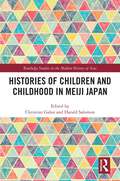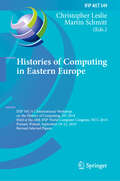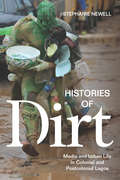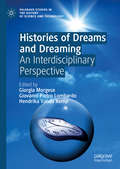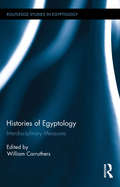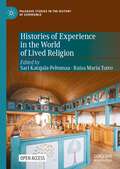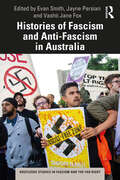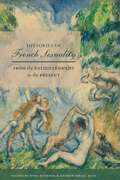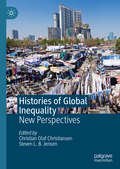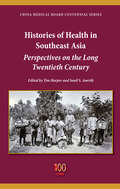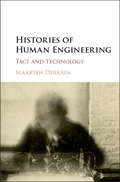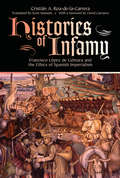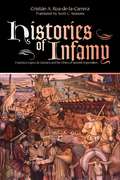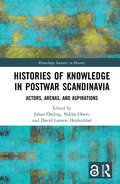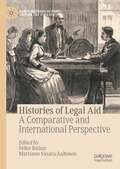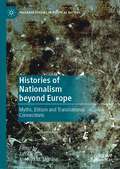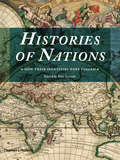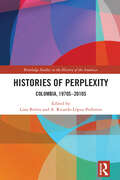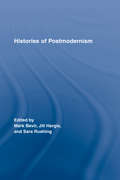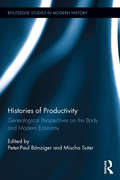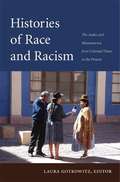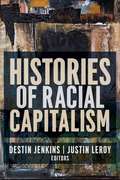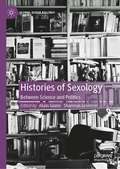- Table View
- List View
Histories of Children and Childhood in Meiji Japan (Routledge Studies in the Modern History of Asia)
by Christian Galan Harald SalomonThis book bridges the gap between historical research on Japan and the field of childhood history by writing children and childhood into the general historical record of the Meiji period.To explore the widely varying circumstances of childhood during the Japanese transition to modernity, the volume presents survey studies and “snapshots” of historical moments by authors from Europe, Japan, and North America. These histories of children and childhood address various thematic aspects, from birth and child-rearing to the representation of childhood in literary works, and these are approached from differing angles, in terms of theoretical perspectives and methodology. The contributions display a particular awareness for the problem of sources in writing the history of childhood and youth. In doing so, they provide precious insights into children’s living circumstances and notions of childhood, also beyond the urban centres of evolving modern Japan.Exploring a wealth of sources including autobiographies, educational essays, government documents, children’s literature, youth journals and medical manuals, this will be a valuable resource to students and scholars of Japanese history, children's studies, the history of education, and social policy more broadly.
Histories of City and State in the Persian Gulf: Manama Since 1800
by Nelida FuccaroIn this path-breaking and multi-layered account of one of the least explored societies in the Middle East, Nelida Fuccaro examines the political and social life of the Gulf city and its coastline, as exemplified by Manama in Bahrain. Written as an ethnography of space, politics and community, it addresses the changing relationship between urban development, politics and society before and after the discovery of oil. By using a variety of local sources and oral histories, Fuccaro questions the role played by the British Empire and oil in state-making. Instead, she draws attention to urban residents, elites and institutions as active participants in state and nation building. She also examines how the city has continued to provide a source of political, social and sectarian identity since the early nineteenth century, challenging the view that the advent of oil and modernity represented a radical break in the urban past of the region.
Histories of Computing in Eastern Europe: IFIP WG 9.7 International Workshop on the History of Computing, HC 2018, Held at the 24th IFIP World Computer Congress, WCC 2018, Poznań, Poland, September 19–21, 2018, Revised Selected Papers (IFIP Advances in Information and Communication Technology #549)
by Christopher Leslie Martin SchmittThis book consitutes the refereed post-conference proceedings of the IFIP WG 9.7 International Workshop on the History of Computing, HC 2018, Held at the 24th IFIP World Computer Congress, WCC 2018, in Poznań, Poland, in September 2018.The 16 revised full papers were carefully reviewed and selected from 20 submissions. They reflect academic approaches to history along with the expertise of museum and other public history professionals as well as the experience of computingand information science practitioners. The papers are organized in the following sections: Eastern Europe, Poland, Soviet Union, CoCom and Comecon; analog computing, and public history.
Histories of Dirt: Media and Urban Life in Colonial and Postcolonial Lagos
by Stephanie NewellIn Histories of Dirt Stephanie Newell traces the ways in which urban spaces and urban dwellers come to be regarded as dirty, as exemplified in colonial and postcolonial Lagos. Newell conceives dirt as an interpretive category that facilitates moral, sanitary, economic, and aesthetic evaluations of other cultures under the rubric of uncleanliness. She examines a number of texts ranging from newspaper articles by elite Lagosians to colonial travel writing, public health films, and urban planning to show how understandings of dirt came to structure colonial governance. Seeing Lagosians as sources of contagion and dirt, British colonizers used racist ideologies and discourses of dirt to justify racial segregation and public health policies. Newell also explores possibilities for non-Eurocentric methods for identifying African urbanites’ own values and opinions by foregrounding the voices of contemporary Lagosians through interviews and focus groups in which their responses to public health issues reflect local aesthetic tastes and values. In excavating the shifting role of dirt in structuring social and political life in Lagos, Newell provides new understandings of colonial and postcolonial urban history in West Africa.
Histories of Dreams and Dreaming: An Interdisciplinary Perspective (Palgrave Studies in the History of Science and Technology)
by Giorgia Morgese Giovanni Pietro Lombardo Hendrika Vande KempIn the late nineteenth century, dreams became the subject of scientific study for the first time, after thousands of years of being considered a primarily spiritual phenomenon. Before Freud and the rise of psychoanalytic interpretation as the dominant mode of studying dreams, an international group of physicians, physiologists, and psychiatrists pioneered scientific models of dreaming. Collecting data from interviews, structured observation, surveys, and their own dream diaries, these scholars produced a large body of early research on the sleeping brain in the late nineteenth and early twentieth centuries. This book uncovers an array of case studies from this overlooked period of dream scholarship. With contributors working across the disciplines of psychology, history, literature, and cultural studies, it highlights continuities and ruptures in the history of scientific inquiry into dreams.
Histories of Egyptology: Interdisciplinary Measures (Routledge Studies in Egyptology #2)
by William CarruthersHistories of Egyptology are increasingly of interest: to Egyptologists, archaeologists, historians, and others. Yet, particularly as Egypt undergoes a contested process of political redefinition, how do we write these histories, and what (or who) are they for? This volume addresses a variety of important themes, the historical involvement of Egyptology with the political sphere, the manner in which the discipline stakes out its professional territory, the ways in which practitioners represent Egyptological knowledge, and the relationship of this knowledge to the public sphere. Histories of Egyptology provides the basis to understand how Egyptologists constructed their discipline. Yet the volume also demonstrates how they construct ancient Egypt, and how that construction interacts with much wider concerns: of society, and of the making of the modern world.
Histories of Experience in the World of Lived Religion (Palgrave Studies in the History of Experience)
by Raisa Maria Toivo Sari Katajala-Peltomaa'At a historic moment, when religion shows all its social and political strength in various post-modern societies around our globe, this fascinating collection of studies from the Middle Ages to twentieth-century Europe demonstrates all the richness and innovative force of investigating individual and shared experiences when questioning the cultural, political and social place of religion in society. It also makes known in English the work of a series of Finnish historians elaborating together a pioneering vision of the notion of experience in the discipline of history.'- Piroska Nagy, Université du Québec à Montréal, Canada This open access book offers a theoretical introduction to the history of experience on three conceptual levels: everyday experience, experience as process, and experience as structure. Chapters apply 'experience' to empirical case studies, exploring how people have made and shared their religion through experience in history. This book understands experience as a simultaneously socially constructed and intimately personal process that connects individuals to communities and past to future, thereby forming structures that create and direct societies. It represents the crossroads of a new field of the history of experience, and an established tradition of the history of lived religion. Chapters offer a longue durée view from the fourteenth-century heretics, via experiences of miracle, madness, sickness, suffering, prayer, conversion and death, to the religious artisanship of soldiers in the Second World War frontlines. It concentrates on Northern Europe, but includes materials from Italy, France and United Kingdom.
Histories of Fascism and Anti-Fascism in Australia (Routledge Studies in Fascism and the Far Right)
by Evan Smith Jayne Persian Vashti Jane FoxHistories of Fascism and Anti-Fascism in Australia provides a history of fascist movements and anti-fascist resistance in Australia over the past century.In recent years, the far right has become a resurgent force across the globe, resulting in populist parties securing electoral victories, social movements organising on the streets, and acts of right-wing terrorism. Australia has not been immune to this. However, this is not merely a recent phenomenon; it has a long history of fascist and far-right groups and individuals. These groups have attempted to situate themselves within the wider settler colonial political landscape, often portraying themselves as the inheritors of a violent and exclusionary colonial past. Concurrently, these groups have linked into globalised anti-communist and white supremacist networks. At the same time, Australia has often seen resistance to fascism and the far right, from the political centre to the far left. Covering the period from the 1920s to the present day, and featuring insights from historians, sociologists, and political scientists, this book provides the most detailed account of this fascinating and important topic. This book will be of interest to students and activists with an interest in the extreme right and anti-fascism as well as Australian history, politics, and society.
Histories of French Sexuality: From the Enlightenment to the Present
by Nina Kushner Andrew Israel RossHistories of French Sexuality contends that the history of sexuality is at a crossroads. Decades of scholarship have shown that sexuality is implicated in a wide range of topics, such as studies of reproduction, the body, sexual knowledge, gender identity, marriage, and sexual citizenship. These studies have broadened historical narratives and interpretations of areas such as urbanization, the family, work, class, empire, the military and war, and the nation. Yet while the field has evolved, not everyone has caught on, especially scholars of French history. Covering the early eighteenth century through the present, the essays in Histories of French Sexuality show how attention to the history of sexuality deepens, changes, challenges, supports, or otherwise complicates the major narratives of French history. This volume makes a set of historical arguments about the nature of the past and a larger historiographical claim about the value and place of the field of the history of sexuality within the broader discipline of history. The topics include early empire-building, religion, the Enlightenment, feminism, socialism, formation of the modern self, medicine, urbanization, decolonization, the social world of postwar France, and the rise of modern and social media.
Histories of Global Inequality: New Perspectives
by Christian Olaf Christiansen Steven L. B. JensenThis book argues that inequality is not just about numbers, but is also about lived, historical experience. It supplements economic research and offers a comprehensive stocktaking of existing thinking on global inequality and its historical development. The book is interdisciplinary, drawing upon regional and national perspectives from around the world while seeking to capture the multidimensionality and multi-causality of global inequalities. Grappling with what economics offers – as well as its blind spots – the study focuses on some of today’s most relevant and pressing themes: discrimination and human rights, defences and critiques of inequality in history, decolonization, international organizations, gender theory, the history of quantification of inequality and the history of economic thought. The historical case studies featured respond to the need for wider historical research and to calls to examine global inequality in a more holistic manner.The Introduction 'Chapter 1 Histories of Global Inequality: Introduction' is open access under a CC BY 4.0 license via link.springer.com.
Histories of Health in Southeast Asia: Perspectives on the Long Twentieth Century (China Medical Board Centennial Series)
by Tim Harper and Sunil S. AmrithHealth patterns in Southeast Asia have changed profoundly over the past century. In that period, epidemic and chronic diseases, environmental transformations, and international health institutions have created new connections within the region and the increased interdependence of Southeast Asia with China and India. In this volume leading scholars provide a new approach to the history of health in Southeast Asia. Framed by a series of synoptic pieces on the "Landscapes of Health" in Southeast Asia in 1914, 1950, and 2014 the essays interweave local, national, and regional perspectives. They range from studies of long-term processes such as changing epidemics, mortality and aging, and environmental history to detailed accounts of particular episodes: the global cholera epidemic and the hajj, the influenza epidemic of 1918, WWII, and natural disasters. The writers also examine state policy on healthcare and the influence of organizations, from NGOs such as the China Medical Board and the Rockefeller Foundation to grassroots organizations in Thailand, Indonesia, and the Philippines.
Histories of Heinrich SchüTz
by Bettina VarwigBettina Varwig places the music of the celebrated Dresden composer Heinrich Schütz in a richly detailed tapestry of cultural, political, religious and intellectual contexts. Four key events in Schütz's career – the 1617 Reformation centenary, the performance of his Dafne in 1627, the 1636 funeral composition Musikalische Exequien and the publication of his motet collection Geistliche Chormusik (1648) – are used to explore his music's resonances with broader historical themes, including the effects of the Thirty Years' War, contemporary meanings of classical mythology, Lutheran attitudes to death and the afterlife as well as shifting conceptions of time and history in light of early modern scientific advances. These original seventeenth-century circumstances are treated in counterpoint with Schütz's fascinating later reinvention in nineteenth- and twentieth-century German musical culture, providing a new kind of musicological writing that interweaves layers of historical inquiry from the seventeenth century to the present day.
Histories of Human Engineering: Tact and Technology
by Maarten DerksenThe dream of control over human behaviour is an old dream, shared by many cultures. This fascinating account of the histories of human engineering describes how technologies of managing individuals and groups were developed from the nineteenth century to the present day, ranging from brainwashing and mind control to Dale Carnegie's art of dealing with people. Derksen reveals that common to all of them is the perpetual tension between the desire to control people's behaviour and the resistance this provokes. Thus to influence other people successfully, technology had to be combined with tact: with a personal touch, with a subtle hint, or with outright deception, manipulations are made palatable or invisible. Combining psychological history and theory with insights from science and technology studies and rhetorical scholarship, Derksen offers a fresh perspective on human engineering that will appeal to those interested in the history of psychology and the history of technology.
Histories of Infamy: Francisco López de Gómara and the Ethics of Spanish Imperialism
by Cristián A. Roa-de-la-Carrera"Roa-de-la-Carrera convincingly shows that Gómara, as well as other historians in the period, cannot easily ignore nor erase the contradictions of the Spanish colonial project." - Luis Fernando Restrepo, University of Arkansas “In an eloquent and thorough exegesis, Roa-de-la-Carrera reveals how and why López de Gómara, having written the best of all possible books in exultation of Spanish imperialism, nevertheless failed to convince the readers of his time." - Susan Schroeder, Tulane University In Histories of Infamy, Cristián Roa-de-la-Carrera explores Francisco López de Gómara's (1511-ca.1559) attempt to ethically reconcile Spain's civilizing mission with the conquistadors' abuse and exploitation of Native peoples. The most widely read account of the conquest in its time, Gómara's Historia general de las Indias y Conquista de México rationalized the conquistadors' crimes as unavoidable evils in the task of bringing "civilization" to the New World. Through an elaborate defense of Spanish imperialism, Gómara aimed to convince his readers of the merits of the conquest, regardless of the devastation it had wrought upon Spain's new subjects. Despite his efforts, Gómara's apologist text quickly fell into disrepute and became ammunition for Spain's critics. Evaluating the effectiveness of ideologies of colonization, Roa-de-la-Carrera's analysis will appeal to scholars in colonial studies and readers interested in the history of the Americas.
Histories of Infamy
by Scott Sessions Cristián A. Roa-de-la-CarreraIn Histories of Infamy, Cristián Roa-de-la-Carrera explores Francisco López de Gómara's (1511-ca.1559) attempt to ethically reconcile Spain's civilizing mission with the conquistadors' abuse and exploitation of Native peoples. The most widely read account of the conquest in its time, Gómara's Historia general de las Indias y Conquista de México rationalized the conquistadors' crimes as unavoidable evils in the task of bringing "civilization" to the New World. Through an elaborate defense of Spanish imperialism, Gómara aimed to convince his readers of the merits of the conquest, regardless of the devastation it had wrought upon Spain's new subjects. Despite his efforts, Gómara's apologist text quickly fell into disrepute and became ammunition for Spain's critics. Evaluating the effectiveness of ideologies of colonization, Roa-de-la-Carrera's analysis will appeal to scholars in colonial studies and readers interested in the history of the Americas.
Histories of Knowledge in Postwar Scandinavia: Actors, Arenas, and Aspirations (Knowledge Societies in History)
by Johan Östling Niklas Olsen David Larsson HeidenbladHistories of Knowledge in Postwar Scandinavia uses case studies to explore how knowledge circulated in the different public arenas that shaped politics, economics and cultural life in and across postwar Scandinavia, particularly in the 1960s and 1970s. This book focuses on a period when the term "knowledge society" was coined and rapidly found traction. In Scandinavia, society’s relationship to rational forms of knowledge became vital to the self-understanding and political ambitions of the era. Taking advantage of contemporary discussions about the circulation, arenas, forms, applications and actors of knowledge, contributors examine various forms of knowledge – economic, environmental, humanistic, religious, political, and sexual – that provide insight into the making and functioning of postwar Scandinavian societies and offer innovative studies that contribute to the development of the history of knowledge at large. The concentration on knowledge rather than the welfare state, the Cold War or the new social and political movements, which to date have attracted the lion’s share of scholarly attention, ensures the book makes a historiographical intervention in postwar Scandinavian historiography. Offering a stimulating point of departure for those interested in the history of knowledge and the circulation of knowledge, this is a vital resource for students and scholars of postwar Scandinavia that provides fresh perspectives and new methodologies for exploration.
Histories of Legal Aid: A Comparative and International Perspective (World Histories of Crime, Culture and Violence)
by Felice Batlan Marianne Vasara-AaltonenThis book focuses on the history of the provision of legal aid and legal assistance to the poor in the nineteenth and twentieth centuries in eight different countries. It is the first such book to bring together historical work on legal aid in a comparative perspective, and allows readers to analogise and contrast historical narratives about free legal aid across countries. Legal aid developed as a result of industrialisation, urbanization, immigration, the rise of philanthropy, and what were viewed as new legal problems. Closely related, was the growing professionalisation of lawyers and the question of what duties lawyers owed society to perform free work. Yet, legal aid providers in many countries included lay women and men, leading at times to tensions with the bar. Furthermore, legal aid often became deeply politicized, creating dramatic conflicts concerning the rights of the poor to have equal access to justice.
Histories of Nationalism beyond Europe: Myths, Elitism and Transnational Connections (Palgrave Studies in Political History)
by Jan Záhořík Antonio M. MoroneThis edited collection explores varying shapes of nationalism in different regional and historical settings in order to analyse the important role that nationalism has played in shaping the contemporary world. Taking a global approach, the collection includes case studies from the Middle East, Africa, Asia and North America. Unique not only in its wide range of geographically diverse case studies, this book is also innovative due to its comparative approach that combines different perspectives on how nations have been understood and how they came into being, highlighting the transnational connections between various countries. The authors examine what is meant by the concepts of ‘nation’ and ‘national identity,’ discussing themes such as citizenship, ethnicity, historical symbols and the role of elites. By exploring these entangled categories of nationalism, the authors argue that throughout history, elites have created ‘artificial ’ versions of nationalism through symbolism and mythology, which has led to nationalism being understood through social constructivist or primordialist lenses. This diverse collection will appeal to researchers studying nationalism, including historians, political scientists and anthropologists.
Histories of Nations: How Their Identities Were Forged
by Peter FurtadoTwenty-eight intimate and unconventional autobiographies of the nation/state, told by historians from their respective countries. Global histories tend to be written from the narrow viewpoint of a single author and a single perspective, with the inevitable bias that it entails. But in this thought-provoking collection, twenty-eight writers and scholars give engaging, often passionate accounts of their own nation's history. The countries have been selected to represent every continent and every type of state: large and small; mature democracies and religious autocracies; states that have existed for thousands of years and those born as recently as the twentieth century. Together they contain two-thirds of the world's population. In the United States, for example, the myth of the nation's "historylessness" remains strong, but in China history is seen to play a crucial role in legitimizing three thousand years of imperial authority. "History wars" over the content of textbooks rage in countries as diverse as Australia, Russia, and Japan. Some countries, such as Iran or Egypt, are blessed--or cursed--with a glorious ancient history that the present cannot equal; others, such as Germany, must find ways of approaching and reconciling the pain of the recent past.
Histories of Perplexity: Colombia, 1970s-2010s (Routledge Studies in the History of the Americas)
by Lina Britto A. Ricardo López-PedrerosBy combining chronological coverage, analytical breadth, and interdisciplinary approaches, these two volumes—Histories of Solitude and Histories of Perplexity—study the histories of Colombia over the past two centuries as illustrations of the histories of democracy across the Americas.The volumes bring together over 40 scholars based in Colombia, the United States, England, and Canada working in various disciplines to discuss how a country that has been consistently presented as a rarity in Latin America provides critical examples to re-examine major historical problems: republicanism and liberalism; export economies and agrarian modernization; populism and cultural politics of state formation; revolutionary and counterinsurgent Cold War violence; neoliberal reforms and urban development; popular mobilization and counterhegemonic public spheres; political ecologies and environmental struggles; and labors of memory and the challenge of reconciliation. Contributors are sensitive to questions of subjectivity and discourse, observant of ethnographic details and micro-politics, and attuned to macro-perspectives such as transnational and global histories.These volumes offer fresh perspectives on Colombia and will be of great value to those interested in Latin American and Caribbean history.
Histories of Postmodernism (Routledge Studies in Cultural History #5)
by Mark Bevir; Jill Hargis; Sara RushingHistories of Postmodernism reexamines the history of the constellation of ideas and thinkers associated with postmodernism. The increasingly dominant historical narrative depicts a relatively smooth development of ideas from Friedrich Nietzsche and Martin Heidegger, through a range of French theorists, most notably Jacques Derrida and Michel Foucault, to contemporary American thinkers such as Richard Rorty, Edward Said, and Judith Butler. Histories of Postmodernism challenges this narrative by highlighting the local contexts of relevant theorists and thus the crucial distinctions that divide successive articulations of the themes and concepts associated with postmodernism. As postmodern ideas traveled from nineteenth-century Germany to mid-twentieth-century France and on to the contemporary United States, so the relevant theorists transformed that heritage within the context of particular intellectual traditions and specific political and aesthetic issues.
Histories of Productivity: Genealogical Perspectives on the Body and Modern Economy (Routledge Studies in Modern History #21)
by Peter-Paul Banziger Mischa SuterGlobal issues such as climate change and the aftermath of the 2008 financial crisis have spurred interest in thinking about the history of the modern economy that goes beyond disciplinary economic history. This book contributes to the cultural history of capitalism and its different regimes of productivity by pursuing the perspective of body history and by providing a global scope. Throughout modernity, the body served as a fundamental, albeit essentially changing, linchpin for both the organization of economic practices and for intellectual reflections on the economy. In particular, it was the pivotal interface to render notions of economic productivity intelligible. The book explores this central thesis in a range of case studies, drawing on source material from West Africa, Europe, Mexico, and the US. Framed by a theoretically informed introduction, which also provides a conceptual history of notions of productivity, and by an afterword that brings the approaches explored in this volume into dialogue with scholarship inspired by Marx and Foucault, the individual chapters tackle the concept of productivity from a wide array of angles, each illuminating the promises and problems of a cultural take on the history of economic productivity.
Histories of Race and Racism: The Andes and Mesoamerica from Colonial Times to the Present
by Laura GotkowitzNinety percent of the indigenous population in the Americas lives in the Andean and Mesoamerican nations of Bolivia, Ecuador, Mexico, Peru, and Guatemala. Recently indigenous social movements in these countries have intensified debate about racism and drawn attention to the connections between present-day discrimination and centuries of colonialism and violence. In Histories of Race and Racism, anthropologists, historians, and sociologists consider the experiences and representations of Andean and Mesoamerican indigenous peoples from the early colonial era to the present. Many of the essays focus on Bolivia, where the election of the country's first indigenous president, Evo Morales, sparked fierce disputes over political power, ethnic rights, and visions of the nation. The contributors compare the interplay of race and racism with class, gender, nationality, and regionalism in Bolivia, Ecuador, Guatemala, Mexico, and Peru. In the process, they engage issues including labor, education, census taking, cultural appropriation and performance, mestizaje, social mobilization, and antiracist legislation. Their essays shed new light on the present by describing how race and racism have mattered in particular Andean and Mesoamerican societies at specific moments in time.ContributorsRossana BarragánKathryn BurnsAndrés CallaPamela CallaRudi Colloredo-MansfeldMaría Elena GarcíaLaura GotkowitzCharles R. HaleBrooke LarsonClaudio LomnitzJosé Antonio LuceroFlorencia E. MallonKhantuta MuruchiDeborah PooleSeemin QayumArturo Taracena ArriolaSinclair ThomsonEsteban Ticona Alejo
Histories of Racial Capitalism (Columbia Studies in the History of U.S. Capitalism)
by Jenkins, Destin; Leroy, JustinThe relationship between race and capitalism is one of the most enduring and controversial historical debates. The concept of racial capitalism offers a way out of this impasse. Racial capitalism is not simply a permutation, phase, or stage in the larger history of capitalism—since the beginning of the Atlantic slave trade and the colonization of the Americas, capitalism, in both material and ideological senses, has been racial, deriving social and economic value from racial classification and stratification. Although Cedric J. Robinson popularized the term, racial capitalism has remained undertheorized for nearly four decades.Histories of Racial Capitalism brings together for the first time distinguished and rising scholars to consider the utility of the concept across historical settings. These scholars offer dynamic accounts of the relationship between social relations of exploitation and the racial terms through which they were organized, justified, and contested. Deploying an eclectic array of methods, their works range from indigenous mortgage foreclosures to the legacies of Atlantic-world maroons, from imperial expansion in the continental United States and beyond to the racial politics of municipal debt in the New South, from the ethical complexities of Latinx banking to the postcolonial dilemmas of extraction in the Caribbean. Throughout, the contributors consider and challenge how some claims about the history and nature of capitalism are universalized while others remain marginalized. By theorizing and testing the concept of racial capitalism in different historical circumstances, this book shows its analytical and political power for today’s scholars and activists.
Histories of Sexology: Between Science and Politics (Global Queer Politics)
by Alain Giami Sharman LevinsonHistories of Sexology: Between Science and Politics takes an interdisciplinary and reflexive approach to the historiography of sexology. Drawing on an intellectual history perspective informed by recent developments in science and technology studies and political history of science, this book examines specific social, cultural, intellectual, scientific and political contexts that have given shape to theories of sexuality, but also to practices in medicine, psychology, education and sexology. Furthermore, it explores various ways that theories of sexuality have both informed and been produced by sexologies—as scientific and clinical discourses about sex—in Western countries since the 19th century.
